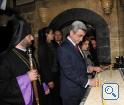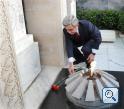Updates
Press releases
23
03, 2010
Official visit of President Serzh Sargsyan to Syria
On the second day of his official visit to the Syrian Arab Republic, President Serzh Sargsyan was hosted at the Damascus University – the oldest educational institution of the country. He delivered a lecture on the Armenian-Syrian relations.
President Sargsyan also met with the President of the People’s Council Mahmoud Al-Abash and discussed issues pertinent to the development of the Armenian-Syrian interparliamentary relations and cooperation in international structures.
On the second day of the official visit to Syria, President Serzh Sargsyan continued his meetings with the leadership of the country. The President of Armenia met also with the Prime Ministry of the SAR Muhammad Naji al-Utar. At the meeting discussed were issues pertinent to the deepening of the Armenian-Syrian economic cooperation. The two sides stressed the importance of fostering relations in the economic area and highlighted the necessity of more active contacts between the business communities through the organization of expos, conferences, and similar events. President Sargsyan noted that the large Armenian community of Syria could become a facilitator of the economic interaction.
Serzh Sargsyan visited the Omayad Mosque of Damascus, which originally was constructed as a Christian temple and later was converted into a mosque. For that very reason in Syria the Omayad Mosque is regarded as a symbol of religious tolerance.
In Damascus, President Sargsyan visited also St. Sarkis Church, where he met with the representatives of the Armenian community. He conversed with them about the future of the Armenian-Syrian relations and expressed confidence that it would be bright and steady regardless of any changes, influence of regional forces or any other factors. According to Serzh Sargsyan, these relations have been greatly influenced also by the Armenian-Syrian community, the longevity and power of which also means the empowerment of Armenia.
With the representative of the Armenian community the President spoke also about the prospects of Armenia’s development, difficulties to be overcome on the way, normalization of the Armenian-Turkish relations, and the prospects of the NK conflict settlement. “Armenia is our common motherland, and Armenian problems are our common problems. For that reason, I believe it is appropriate to consult with our brothers and sisters, who reside outside Armenia, regarding all thorny issues,” the President of Armenia said.
In the evening of March 23, the delegation headed by the President of Armenia left Damascus for Aleppo.
President Sargsyan also met with the President of the People’s Council Mahmoud Al-Abash and discussed issues pertinent to the development of the Armenian-Syrian interparliamentary relations and cooperation in international structures.
On the second day of the official visit to Syria, President Serzh Sargsyan continued his meetings with the leadership of the country. The President of Armenia met also with the Prime Ministry of the SAR Muhammad Naji al-Utar. At the meeting discussed were issues pertinent to the deepening of the Armenian-Syrian economic cooperation. The two sides stressed the importance of fostering relations in the economic area and highlighted the necessity of more active contacts between the business communities through the organization of expos, conferences, and similar events. President Sargsyan noted that the large Armenian community of Syria could become a facilitator of the economic interaction.
Serzh Sargsyan visited the Omayad Mosque of Damascus, which originally was constructed as a Christian temple and later was converted into a mosque. For that very reason in Syria the Omayad Mosque is regarded as a symbol of religious tolerance.
In Damascus, President Sargsyan visited also St. Sarkis Church, where he met with the representatives of the Armenian community. He conversed with them about the future of the Armenian-Syrian relations and expressed confidence that it would be bright and steady regardless of any changes, influence of regional forces or any other factors. According to Serzh Sargsyan, these relations have been greatly influenced also by the Armenian-Syrian community, the longevity and power of which also means the empowerment of Armenia.
With the representative of the Armenian community the President spoke also about the prospects of Armenia’s development, difficulties to be overcome on the way, normalization of the Armenian-Turkish relations, and the prospects of the NK conflict settlement. “Armenia is our common motherland, and Armenian problems are our common problems. For that reason, I believe it is appropriate to consult with our brothers and sisters, who reside outside Armenia, regarding all thorny issues,” the President of Armenia said.
In the evening of March 23, the delegation headed by the President of Armenia left Damascus for Aleppo.












